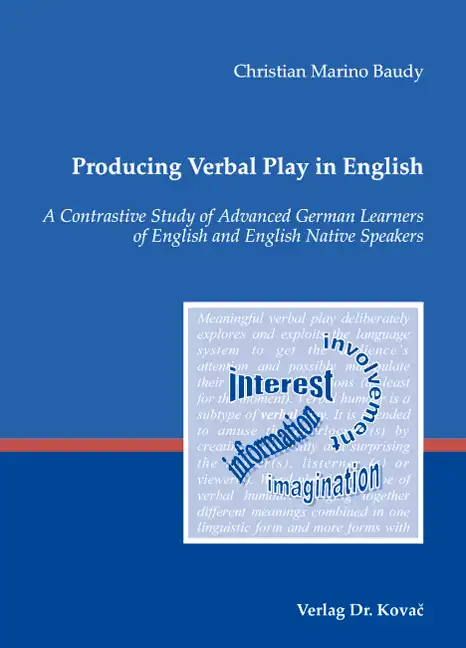Christian Marino BaudyProducing Verbal Play in English
A Contrastive Study of Advanced German Learners of English and English Native Speakers
PHILOLOGIA – Sprachwissenschaftliche Forschungsergebnisse, Band 123
Hamburg 2008, 348 Seiten
ISBN 978-3-8300-3820-7 (Print) |ISBN 978-3-339-03820-3 (eBook)
Zum Inhalt
Verbal play production feeds on the ability to deliberately manipulate language. It is frequently employed by native speakers (of English) in human interaction to achieve a communicative goal „with a laugh?. Foreign language learners hardly employ such strategic moves. Research into foreign language play typically observes and categorizes spontaneous humorous productions. In contrast, the focus of this study is on planned English punning. It aims to uncover the respective language skills that advanced foreign language learners (of English) do not have at their disposal. The respective ethnographic data stem from a word play production task disguised as a translation where play, creative problem-solving and humour link up with native and non-native language skills.
Both the theoretical insights and the empirical results of the present investigation exceed the usual inter-disciplinary scope of foreign language (play) research. First, the inter-related but indiscriminately used concepts of play, creativity and humour are examined, their relationships established and then transferred to the area of language use, language learning and language mediation. Terminological solutions unfold which draw on play theory, creativity research, humour research as well as computational, social and psychological linguistics, and translation theory. This provides foreign language researchers, educators, translation theorists and (applied) linguists as well as researchers in the field of play, humour and creativity with a sound scientific nomenclature. Second, the entirely unexpected performances in both language user groups emphasize the predominantly creative format of the translation experiment. Thus, all case studies are portrayed against the backdrop of creativity-inducing and creativity-hindering factors. Four core components of creative (language) problem-solving are extracted. The tentatively formulated hypothesis covers (i) the similarities and differences between adult advanced German learners of English and English native speakers and (ii) the resultant constraints in foreign language learners. A critical discussion of the results and directions for future research conclude the thesis.
Schlagworte
Applied linguisticsContrastive researchForeign language learningKommunikationKompetenzSecond language communicationSpracheSprachwissenschaftÜbersetzbarkeitÜbersetzungÜbersetzungsäquivalenzWitzIhr Werk im Verlag Dr. Kovač

Möchten Sie Ihre wissenschaftliche Arbeit publizieren? Erfahren Sie mehr über unsere günstigen Konditionen und unseren Service für Autorinnen und Autoren.
